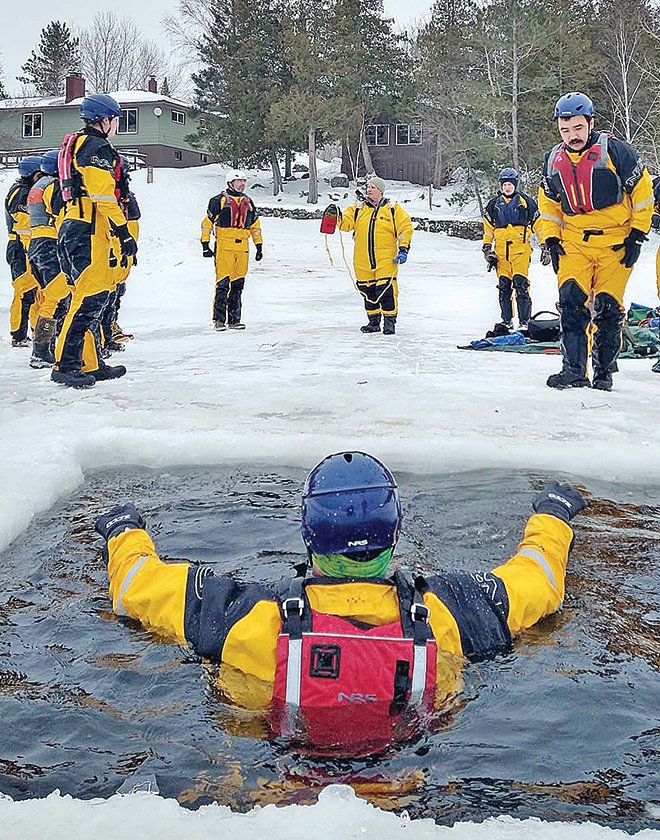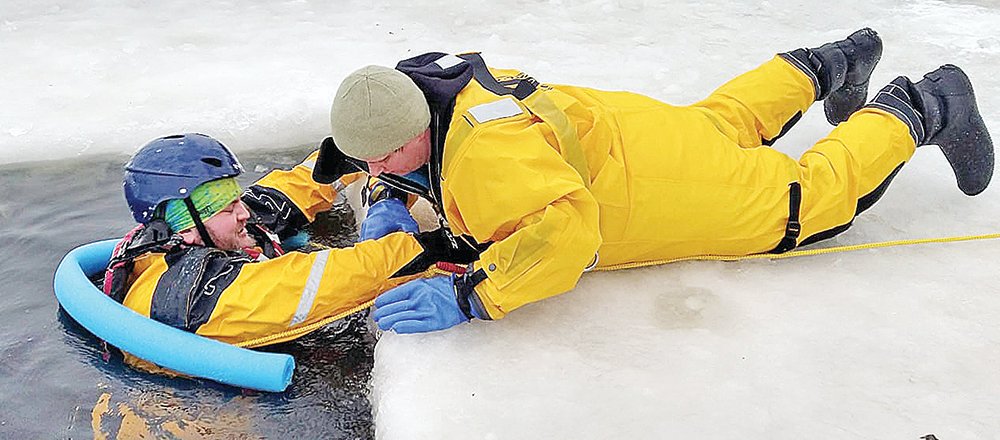Support the Timberjay by making a donation.
CAUTION: No ice is ever safe
VCC students learn safety, rescue awareness
ELY – A gaggle of Vermilion Community College students spent a recent Saturday on thin ice.Well, not really. VCC instructor Alyssa Nelson said the students gathered to gain a greater sense of …
This item is available in full to subscribers.
Attention subscribers
To continue reading, you will need to either log in to your subscriber account, below, or purchase a new subscription.
Please log in to continue |
CAUTION: No ice is ever safe
VCC students learn safety, rescue awareness
ELY – A gaggle of Vermilion Community College students spent a recent Saturday on thin ice.
Well, not really.
VCC instructor Alyssa Nelson said the students gathered to gain a greater sense of competency in dealing with ice rescues as part of the Technical Rescue II course offered at VCC.
“The Ice Safety and Rescue Awareness course is typically full at 20 students for the semester, and in most cases this class is overfilled at 22 because of the interest and student program planners involved,” she said. “Most students who take this course, as well as our Technical Rescue I course in the fall semester, are in the Wilderness and Park Management Program, the Outdoor Leadership Program, or Law Enforcement or Wildland Wildlife Law Enforcement Programs.”
Nelson said the Technical Rescue II course has three components, including Ice Safety and Rescue Awareness, Snowmobile Safety and Rescue Awareness, and Low Angle Rope Rescue Awareness.
“This course takes place over six days throughout the spring semester at VCC,” Nelson said.
Students gathered on a frozen lake outside of Ely on a frigid morning last month with the expectation of getting their feet, and everything else, wet.
“This portion of the course is designed to train the rescuer in the most current techniques in ice rescue,” she said.
The primary objectives of this program are to execute the following:
Train the rescuer how to recognize ice characteristics, its strengths, and weaknesses.
To provide the rescuer with the knowledge to understand how hypothermia can affect both the victim as well as the rescuer.
Train the rescuer in proper techniques in planning and executing the appropriate rescue procedures and equipment using “Talk, Reach, Throw, and Go” methods.
To provide the rescuer with a greater sense of competency in dealing with ice rescues.
“The successes we have in this course are students coming away feeling more prepared to be in an outdoor setting no matter what they are doing, the build-up of confidence they have from putting on the dry suits to getting into the water and being comfortable in the water, and the management of equipment that goes along with all of these technical courses,” Nelson said.
There are challenges that come with the course.
“The equipment is really expensive and I would like to purchase other types of equipment as well so the students get an idea of what equipment types are out there,” she said. “Another challenge is that there is a classroom portion to this we do the night before and that can get pretty long for the students who just want to be outside doing the fun stuff. But along with the getting into the water fun stuff, we need to have that foundation of knowledge so they know why we are doing what we are doing before jumping in.”
According to Nelson, the 2022 ice rescue field day went well.
“The students seemed to have fun while learning the different techniques and feeling comfortable in the water,” she said. “The key is to keep moving or their feet and hands get cold, depending on the weather the day gives us. This year it was pretty nice outside at 15 or so degrees. A few years ago, I did the course and it was in the negatives, but the students toughed it out and made a great day of it.”
The Technical Rescue I course that VCC offers during the fall semester includes Swift Water Rescue Awareness, Boat Operations and Water Rescue Awareness, Wilderness Rescue Awareness, and ATV Operations and Rescue Awareness.
“Typically if a student takes one of these courses they will take the other out of personal interest,” Nelson said.
“These courses are intended to show students a variety of technical rescue areas,” she added. “It will hopefully show them which areas they like or dislike when they get into the job field. If there is an area that interests them, it is suggested that they take more courses in that area. Some job fields will provide training after they get hired and show interest in certain areas.”
Search Management Systems and Wilderness First Responder are other classes at Vermilion that they can take in this area.









